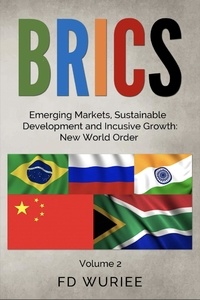BRICS Emerging Markets, Sustainable Development and Inclusive Growth: New World Order pan FD Wuriee
Caractéristiques
- BRICS Emerging Markets, Sustainable Development and Inclusive Growth: New World Order
- FD Wuriee
- Format: Pdf, ePub, MOBI, FB2
- ISBN: 9798215255131
- Editeur: WMG Publishing
- Date de parution: 2023
Ebooks uk téléchargement gratuit BRICS Emerging Markets, Sustainable Development and Inclusive Growth: New World Order par FD Wuriee FB2 PDB iBook 9798215255131
Overview
The BRICS group comprises Brazil, Russia, India, China, and South Africa, and has become a significant geopolitical and economic force in the international arena. Its aim is to promote sustainable development, economic growth, and inclusive prosperity, which has garnered attention worldwide for its potential to reshape the existing world order. Each member nation has different political systems, economies, and social structures that contribute to the group's dynamic nature.
As BRICS nations rise in prominence, they challenge traditional global power structures and provide alternative pathways towards sustainable development and inclusive growth. This exploration aims to analyse the evolving role of BRICS in the new world order. We will delve into the group's commitment to sustainable development, the challenges it faces in achieving its objectives, and its potential impact on international relations and the global economy.
Our aim is to provide a comprehensive understanding of how BRICS, as a cooperative bloc, contributes to the reconfiguration of the existing global landscape. Firstly, this analysis will highlight the inherent economic dynamism of BRICS members. These nations, often referred to as 'emerging markets, ' are home to a significant proportion of the world's population, abundant natural resources, and rapidly expanding middle-class consumer bases.
Their growing economic clout has triggered a shift in global economic influence, with BRICS countries playing pivotal roles in shaping international trade, investment, and financial policies. Moreover, BRICS' commitment to sustainable development is another crucial aspect of their agenda. As countries with diverse ecological challenges and development aspirations, BRICS members recognize the importance of addressing environmental concerns while pursuing economic growth.
This commitment is reflected in initiatives related to renewable energy, climate change mitigation, and the sustainable use of natural resources. BRICS nations are not only seeking to improve their own environmental practices but are also contributing to global discussions on environmental sustainability. In addition to economic and environmental considerations, this analysis will explore the social dimensions of BRICS' agenda.
Inclusive growth, which seeks to address socio-economic inequalities, is a cornerstone of BRICS' collective mission. The member nations are working to provide equitable opportunities for their citizens, improve access to education and healthcare, and alleviate poverty. By focusing on inclusive growth, BRICS demonstrates an alternative model for development that challenges traditional paradigms of inequality and exclusion.
However, despite their economic prowess and commitments to sustainable development and inclusive growth, BRICS nations face significant challenges in achieving their objectives. These challenges include political divergences, structural inequalities, and the need to balance domestic imperatives with international responsibilities. This analysis will critically examine these issues, shedding light on the complexities of coordinating actions among diverse nations with varying priorities.
In conclusion, the emergence of BRICS in the new world order is a compelling phenomenon that holds the potential to reshape global power dynamics. By promoting sustainable development and inclusive growth while representing significant emerging markets, BRICS challenges traditional power structures, raises vital questions about the global economy, and influences the trajectory of international relations.
This analysis seeks to provide a comprehensive understanding of BRICS' role and the complex dynamics at play as they work towards the common goal of a more sustainable, equitable, and inclusive global future.

